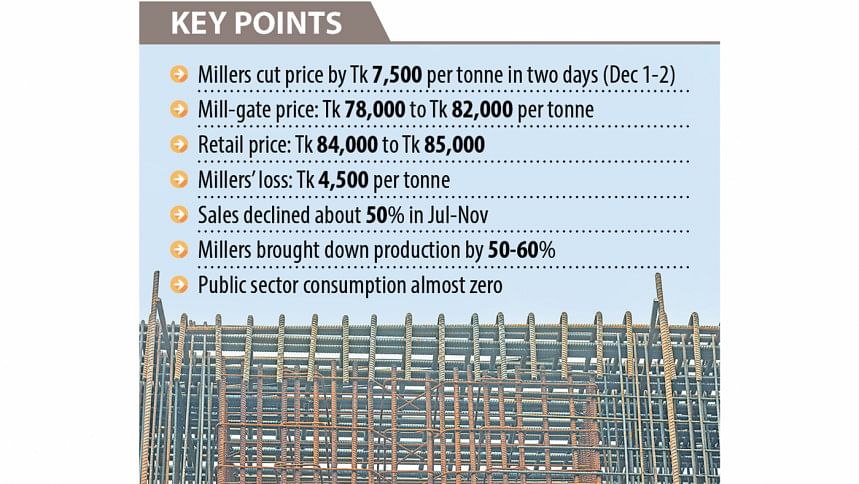No respite for steelmakers as sales depressed since July

The price of mild steel (MS) rods has continued to fall due to low demand for construction materials, especially as public consumption has declined to virtually zero since the political changeover on August 5.
According to the Trading Corporation of Bangladesh (TCB), the price of 60-grade MS rods stood at Tk 85,000 per tonne yesterday, down 7 percent from Tk 93,000 a month ago.
The vital construction material was priced at Tk 99,500 per tonne in September.
Year-on-year, its price has fallen 12 percent, according to the TCB.
Steel consumption in Bangladesh had been falling over the last year or so, in spite of initial expectations of a substantial rise due to growing infrastructure development projects and individual consumption.
The expectations were fuelled by the fact that the government accounted for around 67 percent of the local demand for steel, which stands at 7.5 million tonnes annually.
The steel sector is the second-largest industrial sector in Bangladesh in terms of market size and investment.
There are around 200 manufacturers, including 40 large-scale ones, with a total production capacity of around 11 million tonnes.
However, this government source of sales has gone completely dry as public construction projects have been at a standstill since the Awami League government was ousted by a mass uprising.
Amid uncertainty and protests in July and August, most contractors fled, leading to projects being put on hold. As such, the government's demand for steel has decreased to nearly zero over the past three and a half months.
In light of this, many mills have chosen to shutter furnaces as they were losing money on each tonne of steel produced.
"In order to pay employee salaries and dues, including utility bills and loan installments, millers are now selling products below production costs," said Tapan Sengupta, deputy managing director of Bangladesh Steel Re-Rolling Mills (BSRM).
Steel producers have lowered prices by almost Tk 7,500 to Tk 8,000 per tonne since December 1 in an attempt to clear inventory and meet operating expenses.
"Since demand is lower than before, we must sell our inventory at a loss," Sengupta added.
The demand for steel has also been impacted by the real estate industry's difficulties as a result of persistent inflation, which has hovered above nine percent since March 2023.
In addition, as many local public representatives fled during the political transition and are yet to return, the official approval processes for new individual construction projects in semi-urban and rural areas have been halted.
"If the construction sector does not pick up, the steel industry will suffer," Sengupta said.
Sumon Chowdhury, secretary general of Bangladesh Steel Manufacturers Association, said millers were selling 60-grade MS rods at Tk 78,000 to Tk 82,000 per tonne at mill gates.
"We are facing losses of Tk 4,500 to Tk 6,500 per tonne as our production costs stand at around Tk 84,500 to Tk 90,000 per tonne depending on the mill and location," he said.
He added that the interim government had not taken any firm decision about ongoing construction projects.
He also said there was a risk of many steel millers, except for the few big players in the market, becoming loan defaulters.
Chowdhury urged the government to create a development-friendly environment and urged contractors to start implementation of ongoing projects.
"If the government does not resume implementation work of ongoing projects, the steel sector will fall into further difficulties," he added.

 For all latest news, follow The Daily Star's Google News channel.
For all latest news, follow The Daily Star's Google News channel. 



Comments